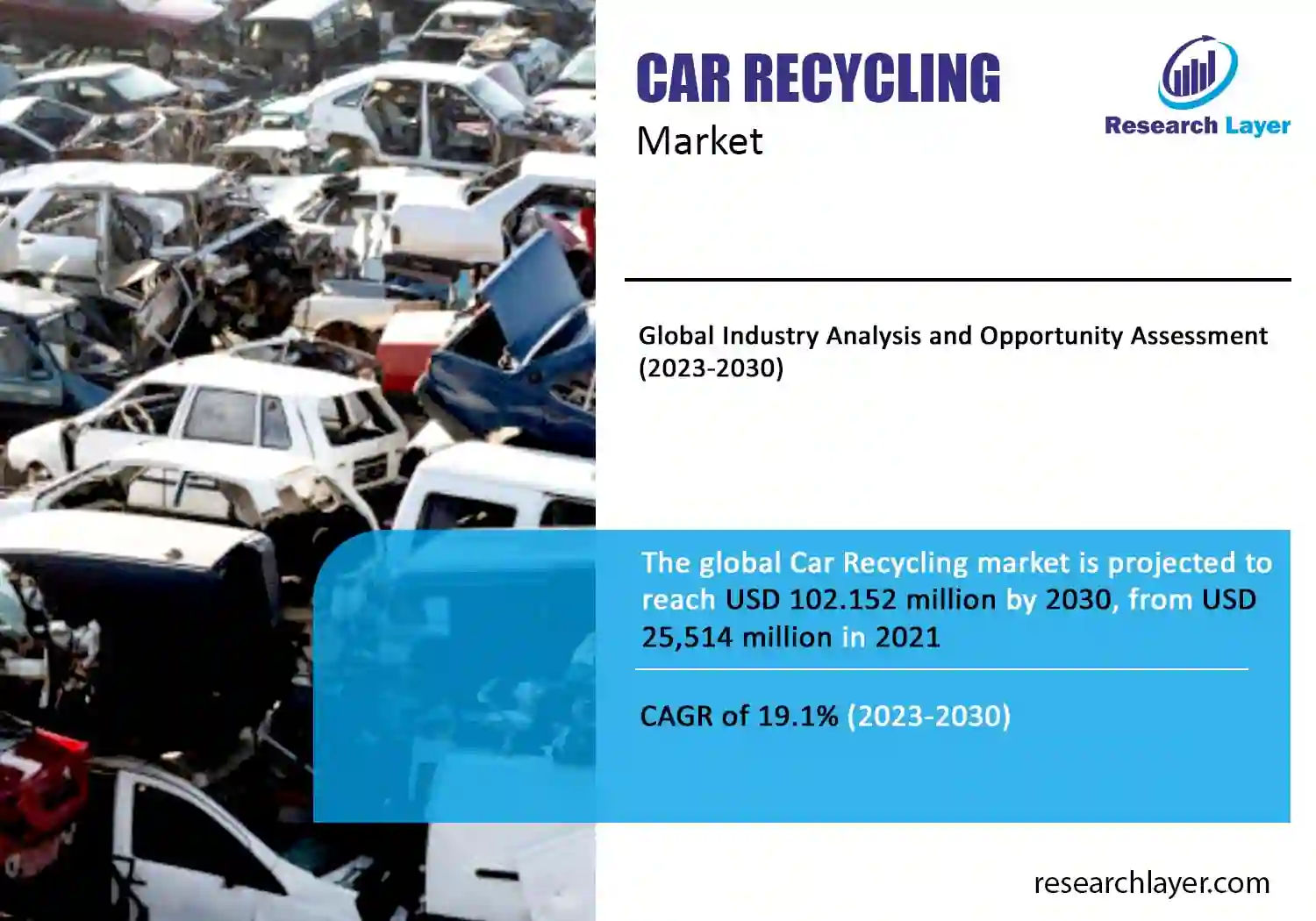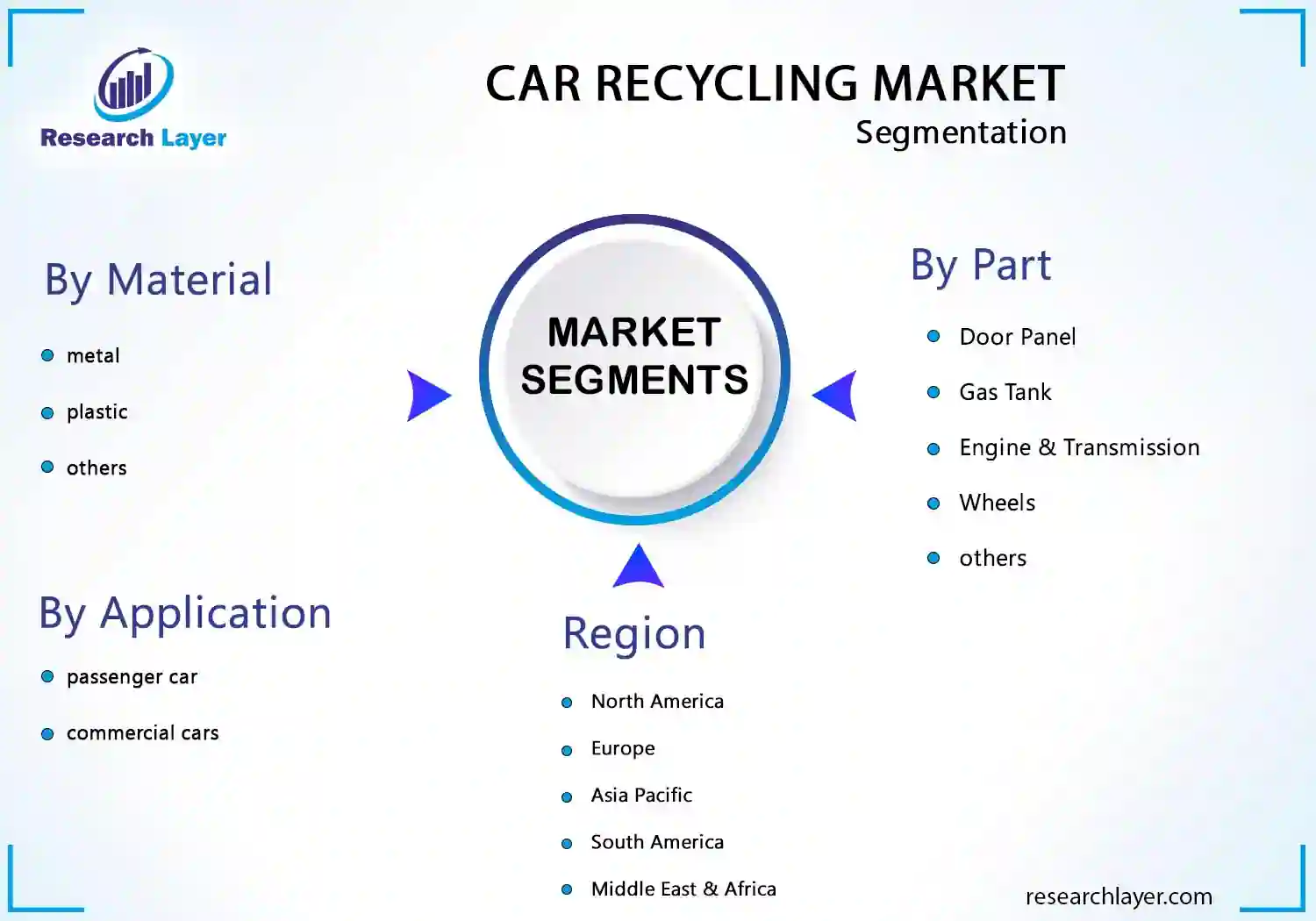 +1 915 229 3004 (U.S.) |
+1 915 229 3004 (U.S.) |  +44 7452 242832 (U.K.)
+44 7452 242832 (U.K.)
 +1 915 229 3004 (U.S.) |
+1 915 229 3004 (U.S.) |  +44 7452 242832 (U.K.)
+44 7452 242832 (U.K.)

According to Research Layer, The global Car Recycling Market is projected to reach USD 102.152 million by 2030, from USD 25,514 million in 2021, and is anticipated to register a CAGR of 19.1% between 2022 and 2030.


Download Free Report Sample to learn more about this report.
A majority of recycling companies focus on recycling cars for parts, as well as components such as glass and plastics. General Motors' Vehicle Use and Ownership Study showed that Americans drive an average of 13,476 miles each year. This means approximately 2,821 gallons of fuel are used a year per vehicle, and 1,066 pounds of pollutants enter the atmosphere. The European Automobile Manufacturers Association has also found that cars in Europe emit around 448,000 tons of carbon dioxide each year.
Recycling a car means recycling all the parts of the vehicle and using them to make new products. It's important because cars contain many recyclable materials, like steel, aluminum, iron, and even some plastics. Recycled materials can be used in a variety of ways from making more cars or bicycles to building homes or just basic consumer items. We're seeing more and more people recycle their vehicles every day.
In 2020 when the news of the pandemic broke, most automotive recyclers saw a 35% dip in business. This decrease continued for several months after that as people stopped driving their old cars due to fear of catching something from someone else's car or even just giving up on working and staying home instead. The automotive recycling industry has been impacted by a decline in new car sales. In 2020, the number of cars sold was only 14.5 million - down from around 15% and 2012 levels at 13M vehicles (qtd). This had an effect on companies like CarMax who are reliant on used vehicle purchases as well as online auction sites such as eBay Motors which is now selling fewer units than it did four years ago when automobile transactions peaked. The car recycling industry is highly reliant on sell of new cars.
The automotive recycling business is down-and-out these days due to the pandemic, and there seems to be no hope in sight. This has forced the recyclers to take a second look at their business model. The demand comes from construction sites, mines, quarries, farm. Despite the overall downturn of the car recycling market this year, there are still those who find the business of recycling cars a lucrative one.
Car Recycling Market Driver:
Rapidly Growing Environment Concerns Due To Vehicular Pollution
One of the major factors driving the demand for car recycling is growing environmental concerns since it is now widely agreed upon that pollution caused by industrialization and motor vehicle exhausts has reached dangerous levels due to factors like climate change making recycling a necessity. Recognizing this, various governments all over the world started enacting policies to get their citizens to recycle and use recycled products wherever possible. The United States has created various incentives in the federal tax code encouraging people to buy older cars which they can then donate for recycling. According to statistics, half of all cars on American roads are more than six years old while 25 percent date back 8-10 years (Gaydos). On the other hand, only 1 percent of the 250 million vehicles registered in the US were manufactured within the last five years. Hence, Americans are now accustomed with buying used and newer models rather than new ones every time they need a car because it is much less expensive.
When a car reaches its 6th year on the road, chances are it will no longer work properly as certain parts wear out while others are broken beyond repair. Instead of spending a huge sum on maintenance and repairs, people tend to sell off their cars for an even bigger amount or donate them for recycling. This is one reason why car recycling has become popular in the US and other countries around the world. In Europe, cars are an essential part of everyday life.
Car Recycling Market Opportunity:
Rising Number of Aging Vehicle and Changing Lifestyle
Social media is prevalent in today's society, and many people use it to show off. In some cases, this can actually lead to increased spending power for consumers as they have the ability to see what other consumers are buying which may prompt them into making a purchase themselves.
The demand for hybrid and electric vehicles is increasing due to the focus on low travel costs. This means that petrol and diesel cars will be heading towards recycling yards, as they can no longer serve this purpose. There has been a noticeable increase in rental car businesses such as Uber who have focused their efforts on these alternative fuel types of vehicle over traditional ones like those used by taxi services or other public transport options. The price of petrol and diesel have increased over the years, which has led to a decrease in travel costs. The other factor that is contributing towards this increase in demand for electric vehicles (EVs) or hybrid cars is due to their environmental benefits where each such vehicle contributes greatly towards reducing pollution levels by as much as 50%.
Car Recycling Market Restraint:
High Cost of Recycling
It costs around $1,400 to recycle a car today while it only costs around 150-300 dollars more to scrap the same vehicle - Some people don't want to pay the extra money and they'd rather salvage the vehicle themselves. It is perfectly legal as long as they avoid mixing parts from different cars (unless you have an automotive salvage yard license).
The global Car Recycling Market has been segmented based on material, Part, application, and region/country.
On the basis of Material, the global market is segmented into metal, plastic and others. Metal held the largest share for the market. The metal industry's share of the global vehicle recycling market is expected to change significantly as a result of an increase in the number of junk cars for scrap auto business, swapping, and recycling.
On the basis of Part, the global market is segmented Door Panel, Gas Tank, Engine & Transmission, Wheels and others.
On the basis of application, the global vehicle recycling market is segmented into passenger car and commercial cars. Passenger car held the largest share for the market. This dominance is owing to Due to various governmental norms, rules and regulations, the old cars are becoming useless.
The global Car Recycling Market has been analyzed for five regions—North America, Europe, Asia-Pacific, the Middle East & Africa, and South America.


Download Free Report Sample to learn more about this report.
The geographic analysis of the global Car Recycling Market has been conducted for North America, Europe, Asia-Pacific, the Middle East & Africa, and South America.
North America dominated the vehicle recycling market. The U.S. Department of Transportation has calculated that recycled materials save as much as 1.9 million gallons of gasoline and diesel fuel each year, reducing carbon monoxide emissions by 26 million pounds a year. Besides reducing carbon dioxide emissions by decreasing the number of cars on the road, recycling helps to reduce air pollution. Recycling can also help relieve stress on America's landfills which currently house around 262 million scrap tires - enough to circle the earth five times. According to an article released by The Smithsonian, recycling cars saves the United States economy approximately $1 billion per year in energy cost savings.
· In October 2020, Hongqiao and Scholz Group signed agreement to establish a recycling park focussing on end-of-life vehicle (“ELV”) dismantling, scrap metals recycling, and research and development of recycling technologies and processes. The project will focus on end-of-life vehicle (“ELV”) dismantling, scrap metals recycling, and research and development of recycling technologies and processes. It is designed to process more than 200,000 tonnes of aluminium scrap and 50,000 end-of-life vehicles per year.
· In November 2019, Toyota and Suzuki established a joint venture to dismantle and recycle vehicles in India. The joint venture will set up the first vehicle dismantling unit in Noida with a capacity to handle 2000 vehicles per month. The joint venture, Maruti Suzuki Toyotsu India Pvt. Ltd (MSTI), will be owned equally by Suzuki’s unit Maruti Suzuki India Ltd and Toyota Tsusho India Ltd, a subsidiary of Toyota. It will build its first vehicle dismantling unit in Noida with a capacity to handle 2,000 vehicles per month. Similar facilities will also be opened in other parts of India.
· In February 2021, Volkswagen Group Components opened its first plant for recycling electric car batteries in Salzgitter, Germany, Feb. 1. The goal of the pilot plant is to industrialize the recovery of raw materials, including lithium, nickel, manganese and cobalt, in a closed loop together with aluminum, copper and plastics, according to a news release from the company. Volkswagen says it plans to achieve a recycling rate of more than 90 percent over the long term.
The key players in the global Car Recycling Market are Scholz Recycling GMBH, Schnitzer Steel Industries Inc., LKQ Corporation, Toyota Motor Corporation, Sims Metal Management Limited,European Metal Recycling (EMR), Hensel Recycling Group, Volkswagen AG, Tianqi Automation Engineering Co.Ltd., Keiaisha Co. and INDRA.
This study estimates revenue growth at global, regional, and country levels and offers an overview of the latest developments in each of the sub-sectors from 2022 to 2030. For this analysis, Research Layer segmented the global Car Recycling Market has based on material, Part, application, and region/country.
· Potential Investors
· Regulatory & Government Bodies
· Research & Consulting Firms
· Upstream & Downstream Vendors
· End Users
· Others
Report Scope
The global Car Recycling Market is expected to exhibit 19.1% during the projected period.
The North America region is expected to dominate the global Car Recycling Market in 2030.
The metal segment is expected to be lucrative for the Car Recycling market during the forecast period.
Passenger vehicles is expected to be the largest contributor to the Car Recycling Market by 2030.
Scholz Recycling GMBH, Schnitzer Steel Industries, Inc., LKQ Corporation, Toyota Motor Corporation, are some of the major key companies of the global Car Recycling Market.
The global Car Recycling market is expected to account for a revenue of 102.152 USD million in 2030 from USD 25,514 million in 2021 and is expected to grow with a CAGR of 19.1% by 2030.


Report Code :
RL6527
Published on :
Dec 2022
Request a Free Sample Report